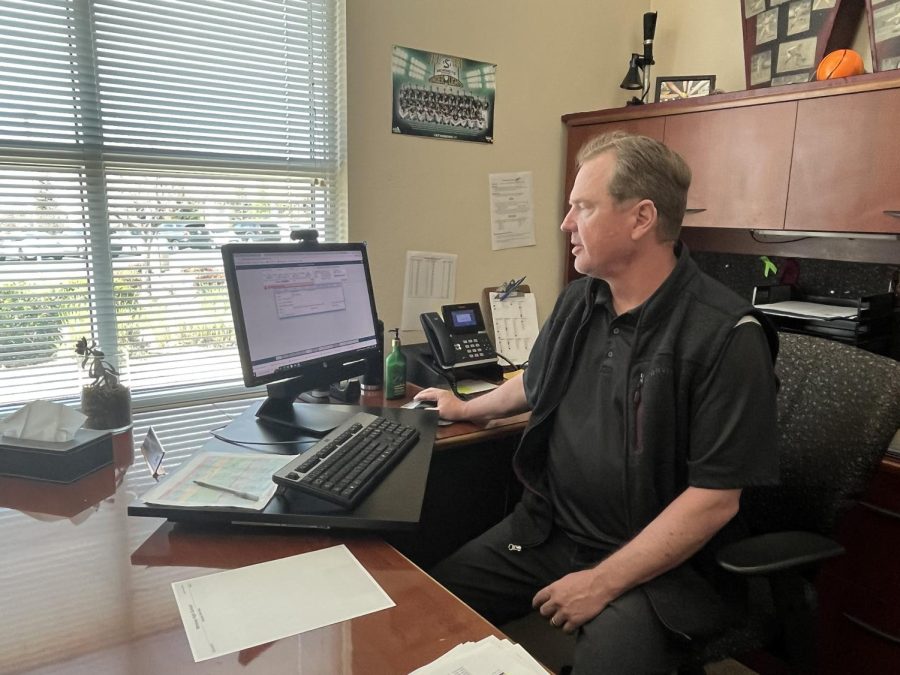Zero periods expected to continue next year, allows schedule flexibility
On his computer April 12, Mr. Floyd looks at this school year’s zero periods in Aeries Portal and prepares zero period schedules for next year. Currently, government, U.S. history, jazz band and varsity football are the only zero periods being offered. Photo by Elias Whitehead
In a world filled with constant stress built on an onslaught of assignments, deadlines, and social interaction. Sleep is the most effective break from day to day school life. However, when students don’t get as long of a break or even a break at all, it has shown to negatively affect academic performance and behavior. This school year, zero periods were first implemented, introducing an extra class period before school. The idea of the zero period was built around the newly introduced schedule that was pushed forward one hour via senate bill 328, signed by Senator Anthony Portantino. School began at 8:45 rather than 7:45 and ended at 3:40 rather than 2:40. The change was made in the hopes of improving student’s sleep schedules and being more mentally prepared for academics.
“Over the past decade, a consensus formed among researchers that later school times would benefit student sleep patterns, which would enable them to walk into class more alert and more prepared for learning,” researcher Tim Walker said (National Education Association).
To create a zero period, there must be enough students who are interested in taking that course and a teacher who is available to teach in the morning.
“Typically it comes with teacher availability because not all teachers are available to teach a zero period class, [as well as] student interest and [what we] feel we can offer them to begin with. And then it fits our schedule and allows for maybe some more students to have an off period at the end of the day,” Counselor Mr. Patrick Floyd said.
Given the new schedule, students lost an hour of after school time dedicated to sports, extracurricular activities, jobs, volunteering and personal matters. With the addition of the zero period option, students can continue to take their necessary classes without the burden of a late bell schedule.
“It can help students who want to be able to take all the classes they need, but want to be able to get off early maybe hour early if they had jobs or other things,” Counselor Mrs. Roisin Leroy said, “Normally, when we got out of school at 2:40, students were able to have jobs and they could start at three o’clock shift or they could have more time for outside sports or extracurricular activities or volunteer work. And so once we started the late start, students didn’t have that opportunity anymore.”
The first instance of a class taught outside of the traditional eight period schedule for Whitney existed in the form of an online government class six years ago. Theater tech taught by Mr. Josh Ansley was introduced next, followed by online english with Mrs. Davis introduced this year. These classes of which worked to create a precedent in the flexibility of student schedules for the fact that online classes show up on transcripts as a 9th period. Eventual seeds planted by this system became fueled by the eventual COVID-19 pandemic. In which online classes were further pushed. Eventually this concept molded itself into the current zero period, a more time efficient method in which students wouldn’t have to dedicate time outside school hours to a class.
However, some classes require you to try out beforehand or have a certain GPA to take that course.
“We’re using GPA as the priority criteria. So right now students about a 3.0 to 3.3 make the cut for U.S. history, jazz band – plenty of room of course because you have to try out for that class. Varsity football, that class is available to all juniors and seniors playing football as well,” Floyd said.
While there is certainly a necessity for extra help outside of a student’s schedule and to make time for personal affairs from students. Those who take zero periods find it more necessary than those who don’t.
“Maybe more people in [zero periods] because we don’t have that many people in the band and we could do with some more. And I think that might apply to other classes as well because the more people are willing to go to zero period, the more it can have,” Maxwell Bowen said.
The primary goal for the use of zero periods is to allow students the time necessary to achieve the credits they need while also having time for other activities that need to be balanced at the same time. However, it becomes evident that the system may not be working just yet.
“I like the start time, it’s the same time that school used to start. But I feel like classes could be a little bit longer. It feels like we often run out of time,” Bradley Klippel said.
In the coming school year, the zero periods that will continue to be offered to students include US History, government, jazz band, and varsity football. All of these have been created with a set amount of available spots in mind given anticipated interest. For example, zero period government has 36 available spots of which 22 have currently been filled.
“I mean, we can add more in the future, we can have less in the future, it just really depends on the whole schedule and teacher interest and all the things that kind of go into building a whole schedule. It’s nice to give some kids some options though, it really is. That’s the bottom line,” Floyd said.
by NICOLLE VALITE AND ELIAS WHITEHEAD








